Utah GOP AG debate: Candidates asked about governor, presidential elections, abortion and social media
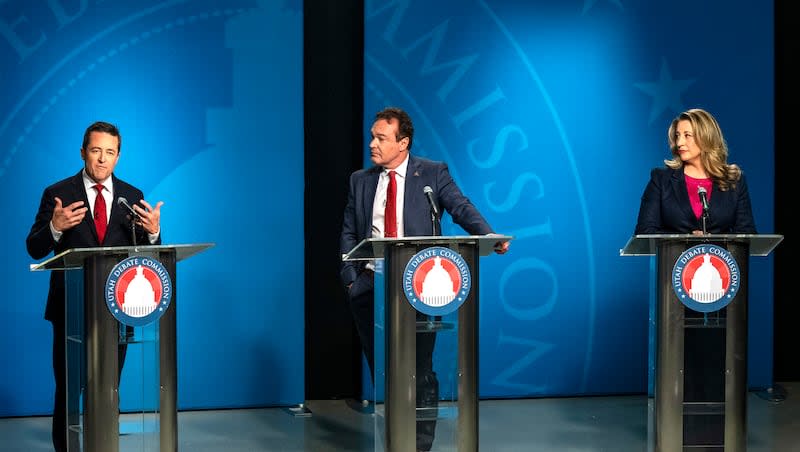
- Oops!Something went wrong.Please try again later.
Derek Brown, Frank Mylar and Rachel Terry — Republican primary candidates for Utah’s attorney general — discussed issues like social media litigation, abortion and fentanyl on Tuesday afternoon in a debate on the University of Utah campus. The candidates were also asked about their choices for governor and president.
And while the candidates had similar positions on some of the topics, it only took a couple of minutes before criticisms began.
Responding to the second question in the debate, Terry said she was concerned about her fellow candidate Brown’s work lobbying for corporations sued by the office.
Brown said Terry misrepresented his work.
“Social media is absolutely an issue with our kids and out of 8,000 lawyers in the state, Meta hired me,” said Brown after the debate. He explained that he worked with legislators, the governor’s office and constitutional experts “to create a series of bills that gave parents the tools that they needed to actually help with their kids on social media.”
Pointing toward his endorsements from Gov. Spencer Cox and other lawmakers, Brown said, “I’m proud of the work we did and in fact, not only the governor who went after social media companies, but the legislators who did as well all have endorsed me in this race.”
Brown is a former Utah GOP chair. He’s also served as a state legislator, former counsel to two U.S. senators and as deputy chief to Sen. Mike Lee, who has endorsed him.
Mylar is an attorney who manages his own firm handling constitutional litigation — he has the backing of the former CEO of Alliance Defending Freedom and he has worked in the attorney general’s office.
Terry is the current director of the Utah Division of Risk Management. She was previously deputy director for the Utah League of Cities and Towns and has the backing of Texas Attorney General Ken Paxton.
The conversation around social media litigation continued during the debate when moderator Glen Mills asked the candidates about the state’s litigation against TikTok.
“I, solemnly, will do everything I can to protect others, not only from predators on things like TikTok, but also in the libraries of schools,” said Mylar. “We should not have sexually explicit material in the schools.”
Terry said she would continue this litigation and ensure the state gets to the heart of the issue. “The social media companies, they know, and they have know for a long time, that they are harming children.”
Confirming that he would continue litigation, Brown said, “To the extent that they violated the Utah Consumer Protections Act, they should be held accountable. This is a major issue.” He added protecting the most vulnerable is one of his top issues.
Issues facing the office
All three candidates agreed on a couple of issues they were asked about. For example, all of them said the attorney general should be elected rather than appointed.
They were all critical of the constitutionality of the lawsuit brought by the teacher’s union — the Utah Education Association — against the Utah Fits All scholarship program. All candidates also spoke about publicly disclosing the work calendar of the attorney general if elected.
Mills asked the candidates about whether or not states should control abortion laws.
Sharing a personal story about being pregnant with her twins and her doctor suggesting she consider an abortion, Terry said this experience has shaped her perspective on the issue.
“I agree with the Supreme Court, who has said that this should be a state-based issue and in Utah, we support families,” said Terry. After the debate, she said she is pro-life and believes there should be limits on abortion.
“I think in Utah the way the abortion bill was written is not going to undermine access to contraception,” Terry said, adding that she thinks Democrats have created fear around both contraception and IVF.
Brown said he and his wife have had personal experiences on this issue and that it matters to him on a constitutional level as well as an ethical and moral level.
Calling himself a constitutional conservative, Brown said the federal government should not have jurisdiction over this issue. He said as attorney general, he would not only defend the Utah’s law, but also push back on federal agencies interpreting regulations in a way that would override state statutes.
Mylar said he would defend the laws passed in the state and considers himself pro-life. He said he thinks it’s important to care for women and to be in the trenches.
“I often meet with women that don’t know whether to have an abortion or to (give the baby up for adoption). In fact, one woman said, if I don’t meet with an attorney and talk to him, I’m going to abort,” said Mylar. He said he met with her and she didn’t have an abortion.
The candidates were also asked about the fentanyl epidemic.
Describing his leadership style as collaborative, Brown said to stop the flow of drugs into the state, he would work with legislative officials and law enforcement.
Mylar said in order to stop fentanyl from coming in, he would work with law enforcement. He also said he believes “we need to close the process” of migrants being brought into the state by outside groups.
As attorney general, Terry said she would work with other attorneys general to sue “to enforce the application of existing U.S. laws at the border.” She also said more resources are needed for sheriffs and counties.
At the conclusion of the debate, the candidates made their final pitches to voters. Terry said as she’s traveled across the state, she’s heard people say they want an attorney general who can fight for them.
“This is the work that I’ve been doing for the last 10 years,” said Terry. “This is the work I want to keep doing.”
Brown gave four reasons for running: Alex, Zach, Eliza and Spencer — the name of his kids.
“I worry about our state. I worry what kind of state we are going to be to them,” said Brown. “And I know that you worry about that as well. We right now have a brief window of time with the Supreme Court where we can actually push back in a way that lets Utahns make Utah decisions and not federal bureaucrats.”
Mylar pointed toward his legal experience saying that he has more of it than his opponents.
“But one thing that’s very different from me than them, more than that, is the kinds of cases that I’ve handled the last 24 years as a private attorney. I’ve handled numerous cases where I’ve vindicated people’s constitutional rights.”
After the debate, Mylar said he would defend laws from the state he disagrees with, but not laws that were unconstitutional.
“Now, if there’s a law that I just disagree with, and we’re not talking about it being constitutional or not, you need to put aside those things as attorney general and be able to be independent and say, we will need to vigorously fight this,” Mylar said.
When asked about a law on the books that he would consider unconstitutional and not defend if it was challenged, Mylar said he was concerned about SB54 — the law that established a second path to the primary ballot via signature gathering.
“It’s created a problem, but the reason I question the constitutionality of that is because Senate Bill 54 is trying to regulate a private party, the Republican Party, and tell them how they can select their candidates,” said Mylar. “I don’t believe that’s constitutional. It’s something I need to look at, but it’s my duty if I think something’s not constitutional to not defend it.”
The politics and the money
The candidates also were asked about who they’d vote for and and about money.
Mylar said he would vote for former President Donald Trump.
“I know that there’s a lot of Republicans that are questioning that,” said Mylar. “I think they need to look at his record. His record was amazing.”
As for governor, Mylar said he was “very offended when Governor Cox vetoed the women’s sports bill two years ago.” He said he would vote for Rep. Phil Lyman, R-Blanding.
Terry voiced support for Trump and said since she works for the government, she feels like it would be inappropriate for her to not remain neutral.
Saying he’ll vote for Trump, Brown said he thinks the former president has a good policy track record. “I don’t always like the way he speaks. Most of us don’t, but we could do so much more as a state if he’s in the White House.”
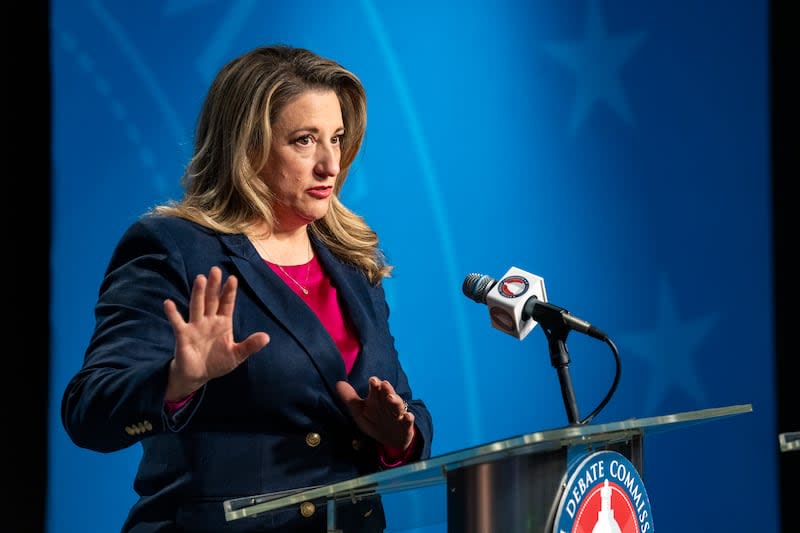
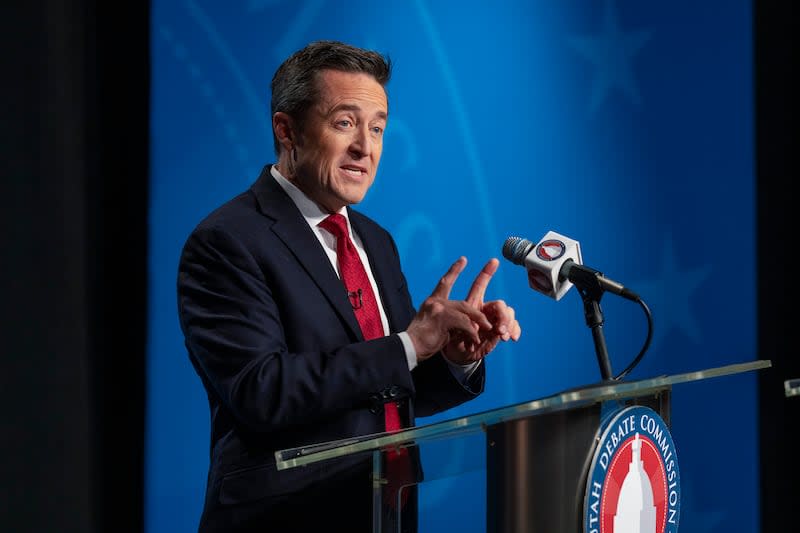
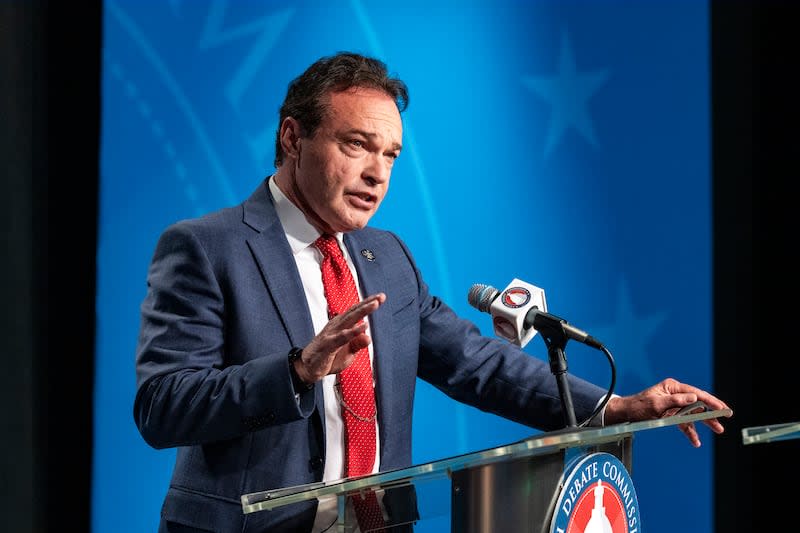
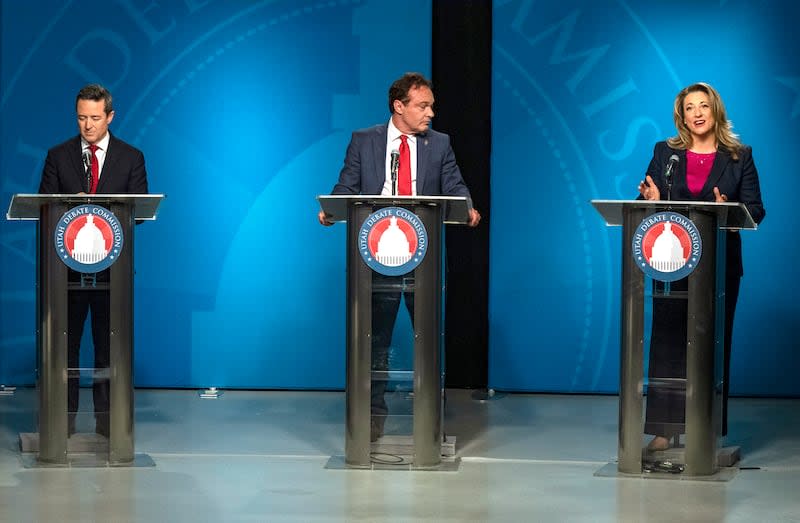
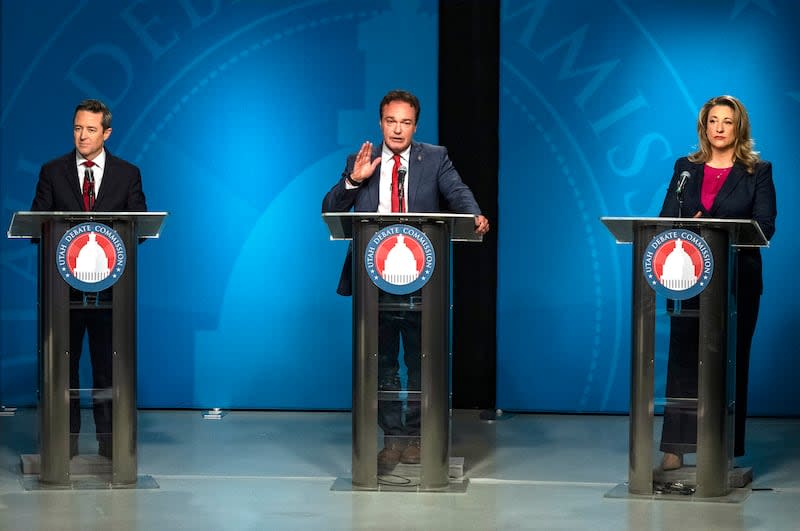
Brown also said he supports Cox because of his conservative track record.
All the candidates for attorney general also spoke about the Trump verdict in interviews after the debate.
Terry said the jury did what they were asked to do, but the case “required cobbling together misdemeanor laws in order to create a felony.”
“What’s most troubling about it is the nation sees this as a very politicized prosecution,” said Terry. She said she also sees it as political prosecution.
Calling it “one of the biggest miscarriages of justice,” Mylar said it was unconstitutional and “this is something that should frighten everyone in this country.”
“One, the judge instructed the jury that they did not need to be unanimous on all aspects of the verdict. That is plainly unconstitutional,” said Mylar. “There were numerous evidentiary rulings throughout the trial, and almost all of them were denied, which is unheard of. Usually, you see at least some parity.”
Brown was critical of the prosecutor campaigning on prosecuting Trump. He also said it’s possible the appeals process will lead to a different result in the end.
During the debate, explicit and implicit references were made to endorsements and the funding candidates received.
Mylar touted that he’s received small donor donations rather than donations from corporations and PACs.
“What’s priceless is nobody owns me, I can actually be independent,” said Mylar adding that he isn’t seeking donations from certain groups because he doesn’t want to be beholden to them.
Terry referenced Brown securing Cox’s endorsement and donations from politicians.
After the debate, Terry said it “undermines the independence of the attorney general” if the governor and legislature have given money to your campaign. When asked if she would take money from legislators or the governor if it was donated the campaign, she said, “I don’t have to answer, like, that’s not on the table right now.” She said most of her donations have come from people who know her.
“Now the reality is when people complain about other people’s endorsements, I think what they’re really complaining about is the fact that they didn’t get the endorsement to begin with,” said Brown after the debate.
“I’ve been endorsed by the Speaker of the House, the Senate President, the Governor, Senator Mike Lee. They don’t always agree on issues. They simply don’t and they know that,” said Brown. “So this idea that I could be beholden to one person or the other simply isn’t the case.”
Brown also said he receives funding from a variety of donors across the political spectrum, both big and small, and he tells them he will always do what he thinks is right.
“I think the reality is the broader the base of support, the less beholden you could say anyone is to anything.”

